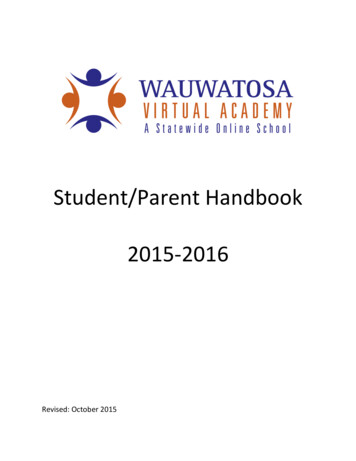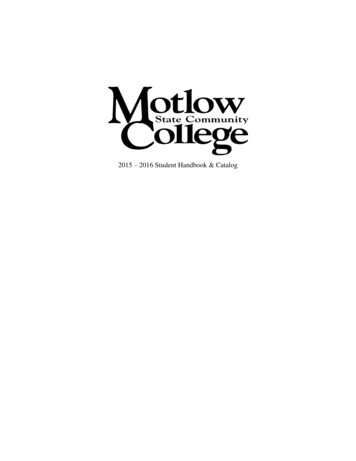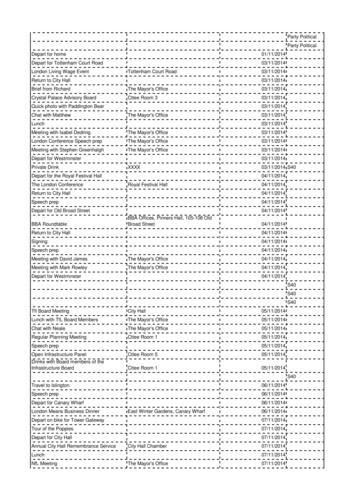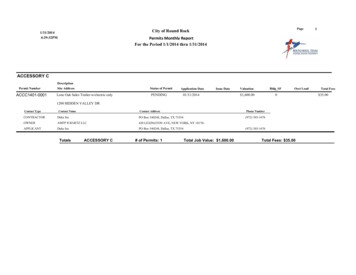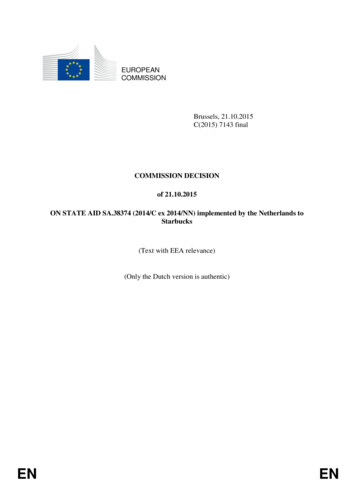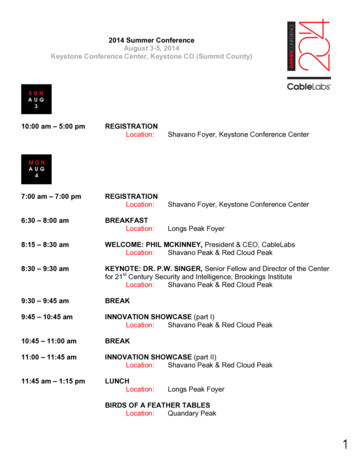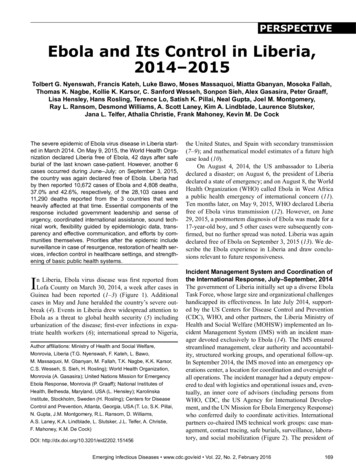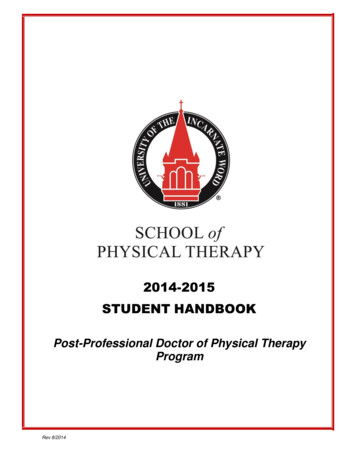
Transcription
2014-2015STUDENT HANDBOOKPost-Professional Doctor of Physical TherapyProgramRev 8/2014
Student HandbookTable of ContentWelcomeThe Objectives of the Mission1University Mission Statement1University Core Values2School of Physical Therapy Mission2Graduate Outcomes3Accreditation Status3Non-discrimination Policy3Disability Services3Academic Calendar3Faculty and Staff Office Hours4Professional Behaviors4Student Code of Conduct5Violation of Student Code of Conduct5APTA Code of Ethics5Social Media Policy6Alcohol and Drug Policy7Sexual Misconduct8Student ResponsibilitiesHealth Insurance8Mandatory Course Evaluation8Oral and Written Communications9Technology Requirements10Academic PoliciesLeave of Absence11Withdrawal11Course Numbers11Course Load11Assessment Policy11Grading System and GPA11Grade Appeal13Scholastic Standing13Academic Probation13Rev 8/2014Page iii
Repeating Courses14Harassment14Addressing DPT Program Complaints14Academic Integrity and Sanctions15Forms of Academic Dishonesty16Procedures for Investigating Claims of Academic Dishonesty and17Student Complaint Policy17Sanctions Assessed by Faculty17Sanctions Assessed by the Academic Honor Board17Appeals of Disciplinary Sanctions Assessed by Academic Honor Board18Handling of Complaints Falling Outside of the Realm of Due Process19Academic Advisement/Academic Policies19Administrative Department20UIW Policies, Procedures, or Personnel20Student Educational Records20Transcripts21Privacy and Confidentiality21Directory Information and Student Confidentiality21HIPAA22Authorized Access and Use of Information Regarding Patients/Clients21Human Subjects in Demonstrations and Practices of Physical Therapy22Additional ResourcesMediation Services22The Student Government Association22Curriculum23Course Waiver24Application for Graduation25Appendices and FormsAcademic Integrity PledgeAccident / Incident ReportAcknowledgement of Student HandbookAppeal Form for Student Complaints about Faculty DecisionsAuthorization for Human Subjects in the Class or LaboratoryPhoto Release FormStudent Receipt of Complaint Procedure Guidelines and FormsRev 8/2014Page iii
WelcomeWelcome to the University of the Incarnate Word (UIW) Post-Professional Doctor of PhysicalTherapy (DPT) program. We are proud to have you as a student. You have made a deliberatedecision to further your education at UIW and we fully expect that you will embrace the missionof the School and develop to become leaders in the physical therapy profession and changeagents in the community. We are committed to your success as you navigate and progressthrough the high demands of academic and professional practice learning.This student handbook provides you with the policies and procedures specific to the PostProfessional DPT program. We would like you to be familiar with the content and keep it as areference. As you have questions, become stressed, or just need someone to speak with,please know that both full time and associate faculty members are here to listen and help as wecan. Your success is important to us. Our hope is for you to set goals and objectives foryourself to achieve optimal personal, academic and professional growth.Objectives of the UIW Mission Statement Articulate more effectively the Mission statement, its core values, and IncarnationalSpirituality so that integration can occur in the professional and personal lives of UIWemployees. Create a greater awareness of and appreciation for the history, heritage and values of theCongregation of Sisters of Charity of the Incarnate Word as the underpinning of the UIWmission and culture. Define structures on or around which a mission culture is built. Review and collaborate on revision of evaluation tools which can more effectively measurestaff performance in relation to the mission and core values. Develop a simple process to examine present systems, structures and policies in light of themission and criteria for assessing mission integration. Promote a deeper understanding of the Christian education vocation and the Catholicidentity of UIW.University Mission StatementThe first Sisters of Charity of the Incarnate Word, three young French women motivated bythe love of God and their recognition of God's presence in each person, came to San Antonio in1869 to minister to the sick and the poor. Their spirit of Christian service is perpetuated in theUniversity of the Incarnate Word primarily through teaching and scholarship, encompassingresearch and artistic expression. Inspired by Judeo-Christian values, the University aims toeducate men and women who will become concerned and enlightened citizens.The university is committed to educational excellence in a context of faith in Jesus Christ,the Incarnate Word of God. It promotes life-long learning and fosters the development of thewhole person. The faculty and students support one another in the search for and thecommunicationRev 8/2014Page 1
of truth. The university is open to thoughtful innovation that serves ever more effectively thespiritual and material needs of people. The curriculum offers students an integrated program ofliberal arts and professional studies that includes a global perspective and an emphasis onsocial justice and community service.The University of the Incarnate Word is a Catholic institution that welcomes to its communitypersons of diverse backgrounds, in the belief that their respectful interaction advances thediscovery of truth, mutual understanding, self-realization, and the common good.University Core ValuesFAITHThe University is committed to educational excellence in a context offaith in Jesus Christ, the Incarnate Word of God.SERVICEThe curriculum includes a global perspective and an emphasis onsocial justice and community service.INNOVATIONThe University is open to thoughtful innovation that serves evermore effectively the spiritual and material needs of people.TRUTHThe faculty and students support one another in the search for andthe communication of truth.EDUCATIONThe University aims to educate men and women who will becomeconcerned and enlightened citizens.School of Physical Therapy MissionTo innovatively educate physical therapists who, through skilled, reflective, patient-centeredpractice, optimize movement and wellness for the common good of society.The Post Professional DPT program develops and extends the practice skills and expertiseof practicing therapists with an emphasis on: Integrating knowledge and theory from the foundational, clinical and professional sciencesinto practice Critical self-assessment and adult learning skills Refining clinical reasoning and decision-making skills Gaining broad perspectives on organizational, financial and social policies that are central topractice and shape the future of the profession Opportunities for professional practice in a focused areaRev 8/2014Page 2
Graduate Outcomes1. Practice in diverse global environments, distinguished by their competence, mindfulness,compassion, willingness to collaborate with others for the welfare of patients and clients,ethical and legal compliance, and with confidence in their knowledge, abilities, skills andvalues.2. Incorporate the research process to enhance the quality of care and services availableto individuals and communities.3. Fulfill their commitment to personal and professional growth.Accreditation StatusThe University of the Incarnate Word is accredited by the Commission on Colleges,Southern Association of Colleges and Schools, 1866 Southern Lane, Decatur, Georgia 300334097, telephone 404-679-4500, Web site: www.sacscoc.org.Non-Discrimination PolicyThe University of the Incarnate Word complies with all applicable federal and statenondiscrimination laws, and does not engage in prohibited discrimination on the basis of race,color, nationality or ethnic origin, gender, age or disability in either employment or the provisionof services. As a Catholic institution of higher education sponsored by the Sisters of Charity ofthe Incarnate Word, the University of the Incarnate Word is, however, exempt from compliancewith some provisions of certain civil rights laws, including some provisions of Title IX of theEducation Amendments of 1972. The University of the Incarnate Word is exempt from theprohibition against religious discrimination of the Civil Rights Act of 1964. In accordance with 41CFR Chapter 60, it shall not be a violation of the equal opportunity clause required byExecutive Order 11246 for the University of the Incarnate Word to establish a hiring preferencefor applicants of the Catholic faith. The university reserves the right to exercise this hiringpreference as required to maintain its Catholic identity. Incarnate Word students areresponsible for knowing the information, policies and procedures outlined in this handbook.Disability ServicesThe University is committed to providing a supportive, challenging, diverse, and integratedenvironment for all students. In accordance with Section 504 of the Rehabilitation Act—SubpartE and Title III of the Americans with Disabilities Act (ADA), the University ensures accessibilityto its programs, services and activities for qualified students with documented disabilities. Formore information contact the Student Disability Services Office: Director, Moises Torrescano atmoisest@uiwtx.edu (Phone: 210-829-3928 Fax: 210-829-5895); http://uiw.edu/sds/).Academic CalendarThe final PPDPT Academic Calendar is available in appendix and online ssional-dpt/ It is important to note that thePPDPT calendar is different from the entry-level DPT academic calendar as well as from theUIW Academic Calendar is available online at: http://www.uiw.edu/registrar/deadlines.htmRev 8/2014Page 3
Faculty Office HoursIndividual faculty members will be available by appointment only.PROFESSIONAL BEHAVIORSIt is expected that all students demonstrate behaviors consistent with those of a healthcareprofessionals. This is demonstrated by:Critical Thinking - The ability to question logically; identify, generate and evaluate elementsof logical argument; recognize and differentiate facts, appropriate or faulty inferences, andassumptions; and distinguish relevant from irrelevant information. The ability toappropriately utilize, analyze, and critically evaluate scientific evidence to develop a logicalargument, and to identify and determine the impact of bias on the decision making process.Communication - The ability to communicate effectively (i.e. verbal, non-verbal, reading,writing, and listening) for varied audiences and purposes.Problem Solving – The ability to recognize and define problems, analyze data, develop andimplement solutions, and evaluate outcomes.Interpersonal Skills – The ability to interact effectively with patients, families, colleagues,other health care professionals, and the community in a culturally aware manner.Responsibility – The ability to be accountable for the outcomes of personal andprofessional actions and to follow through on commitments that encompass the professionwithin the scope of work, community and social responsibilities.Professionalism – The ability to exhibit appropriate professional conduct and to represent theprofession effectively while promoting the growth/development of the Physical Therapyprofession.Use of Constructive Feedback – The ability to seek out and identify quality sources offeedback, including instructors and colleagues, reflect on and integrate the feedback, andprovide meaningful feedback to others.Effective Use of Time and Resources – The ability to manage time and resourceseffectively in order to obtain the maximum possible benefit.Stress Management – The ability to identify sources of stress and to develop andimplement effective coping behaviors; this applies for interactions for: self, patient/clients andtheir families, members of the health care team and in work/life scenarios.Commitment to Learning – The ability to self-direct learning to include the identification ofneeds and sources of learning; and to continually seek and apply new knowledge, behaviors,and skills.Professional behaviors are evaluated by self-assessment, peer review, instructor evaluation,and class participation. Written peer comments and instructor observation of studentperformance provide the basis for counseling on professional behavior. It is expected that mostcases of professional misbehavior can be successfully corrected by sensitive discussion andcounseling between the faculty and the student. A plan for remediation will be developed andimplemented.Rev 8/2014Page 4
Student Code of ConductThe School of Physical Therapy subscribes to the University of the Incarnate Word StudentCode of Conduct that may be found in the UIW Student Handbook (Appendix B) available athttp://www.uiw.edu/campuslife/judicial.html (accessed June 2013).Violation of Student Code of ConductNon-academic infraction and will be reviewed case by case and may ultimately result in acitation added to the student record, a probationary event or dismissal from the program. TheDean or designee will assume responsibility for the investigation of an allegation of misconduct todetermine if the complaint has merit. No complaint will be forwarded for a hearing unless there isreasonable cause to believe a policy has been violated. Reasonable cause is defined as someinformation to support each element of the offense, even if that information is merely a crediblewitness or victim’s statement. A complaint wholly unsupported by any information will not beforwarded for a hearing.If the allegations can be disposed of by mutual consent of the parties involved on a basisacceptable to the parties involved and the Dean, such disposition will be final and there will beno subsequent proceedings. The Dean has discretion to refer a complaint for mediation. Allparties must agree to mediation, and to be bound by the decision with no review (appeal). Anyunsuccessful mediation can be forwarded for formal processing and hearing. However, at notime will complaints of physical sexual misconduct or violence be mediated as the soleinstitutional response. The Dean may also suggest that complaints that do not involve a violationof the Student Code of Conduct be referred for mediation.If the complaint cannot be disposed of in a manner mutually acceptable, the Dean will referthe complaint to the Student Conduct Review Council (SCRC), a body of students responsiblefor assisting in the interpretation and implementation of the Student Code of Conduct andconduct process. Members are responsible for ensuring that students receive the proceduralfairness rights granted them. These rights are detailed below. There is generally a preference torefer disputed complaints to the SCRC, though the Dean retains ultimate discretion overcomplaint referrals.APTA Code of Ethics and Core ValuesThe American Physical Therapy Association (APTA) has adopted a Code of Ethics for allphysical therapists to abide by. The student is expected to learn and practice in an ethicalmanner. See www.apta.org for specific details on APTA 8 ethical principles and 7 core values.As a UIW DPT student, you are expected to be a student member of the APTA. You arehighly encouraged to participate in state chapter and national activities. Please see the websiteand speak with your advisor for more information.The APTA is the professional organization for physical therapists in the United States. Thereare many resources and benefits to being a member both as a student and professional. As astudent you may attend the state and national conferences and student conclave all atdiscounted rates.Rev 8/2014Page 5
Social Media PolicyThis policy applies to all University of the Incarnate Word (UIW) students and employeeswho use social media in either a professional or a personal capacity. Employees include faculty,staff and administrators, including those employed in an adjunct, part-time or temporarycapacity. Professional use includes contributing to UIW-sponsored or other social media siteswhile representing UIW in an official capacity. Personal use refers to employees or students whouse social media as part of their personal life.The purpose of this policy is to provide guidelines for the responsible use of social mediaresources. These resources include, but are not limited to Facebook, YouTube, Twitter, Flikr,Blogs, Wikis, MySpace and LinkedIn.UIW encourages the use of social media by university offices, faculty, and students toenhance our local, national and global reputation and our connection with current and futurestudents, parents, alumni, donors, and other key constituencies. When used responsibly, socialmedia sites provide an effective way to promote the university and to share information andperspective across a broad range of topics.All UIW-sponsored social media sites must be approved and registered with the university’sChief Information Officer in the Office of Information Technology. All UIW-sponsored socialmedia sites must include the names and contact information of at least two (2) siteadministrators. Social media sites affiliated with a student organization should register a sitesponsor through the Dean of Campus Life. Sites representing UIW may be reviewed andamended for content.Guidelines for the Responsible Use of Social Media in a PROFESSIONAL CapacityUIW students or employees who manage or post to UIW-sponsored social media sitesshould: Exercise good judgment. Protect and enhance the value of UIW’s mission by avoidingcomments, photos, videos or images that could be interpreted or perceived as slurs,demeaning, inflammatory, unduly suggestive, inappropriate or otherwise contrary to theuniversity’s Mission. Protect confidential information and relationships. Do not post confidential, proprietary orcontroversial information about the university, its students, alumni or employees.Respect copyright and fair use laws by obtaining proper permissions and givingappropriate credit for work. Follow university policies and federal regulations, such asFERPA, HIPAA, and PHI. If employed by UIW, use social media sites during working hours only if you have abusiness-related need to do so and your supervisor has approved. Be authentic. State that you work at UIW, include your name and title. Transparency iscritical in the social media environment. Stick to your area of expertise and provide unique, individual perspectives on nonconfidential activities at UIW. If you have a vested interest in what you are discussing, bethe first to say so; it adds to your credibility. Use official UIW logos only as specified in the university style guide. Consider the public nature and longevity of comments before posting.Rev 8/2014Page 6
Keep sites current by refreshing content regularly, responding to questions in a timelymanner, and updating information.Guidelines for the Responsible Use of Social Media in a PERSONAL CapacityWhen using social media sites in a personal capacity, employees and students should: Maintain clear lines between professional and personal social media activities. Avoid using the university’s name to promote or endorse any product, cause, religiousview, political party, candidate, etc. Avoid using the university’s name in connection with comments, photos, videos orimages that could be interpreted or perceived as slurs, demeaning, inflammatory,illegal, unduly suggestive, sexual innuendo, inappropriate or otherwise contrary to theuniversity’s Mission. Remember that libel laws are in effect even when your social media accounts are set to“private.” Refrain from posting content such as images or medical records that represent a breachof confidentiality. Maintain appropriate boundaries. (For example, health professionals should not “friend”patients on their personal sites.) Be advised that personal information can be used to perpetrate identity theft which cancompromise the security of students, employe
Sanctions Assessed by the Academic Honor Board 17 Appeals of Disciplinary Sanctions Assessed by Academic Honor Board 18 Handling of Complaints Falling Outside of the Realm of Due Process 19 Academic Advisement/Academic Policies 19 Administrative Department 20 UIW Policies, P
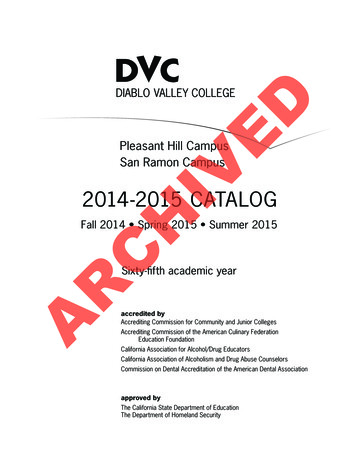
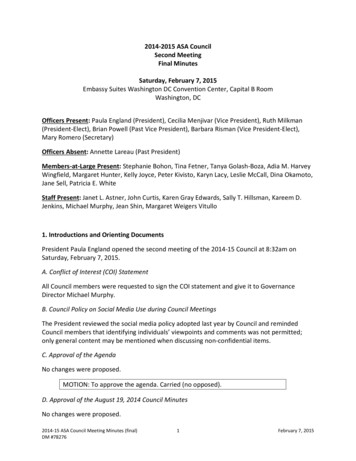
![ACCOUNTING HANDBOOK 2014-2015[2] - UMSL](/img/6/handbk.jpg)
